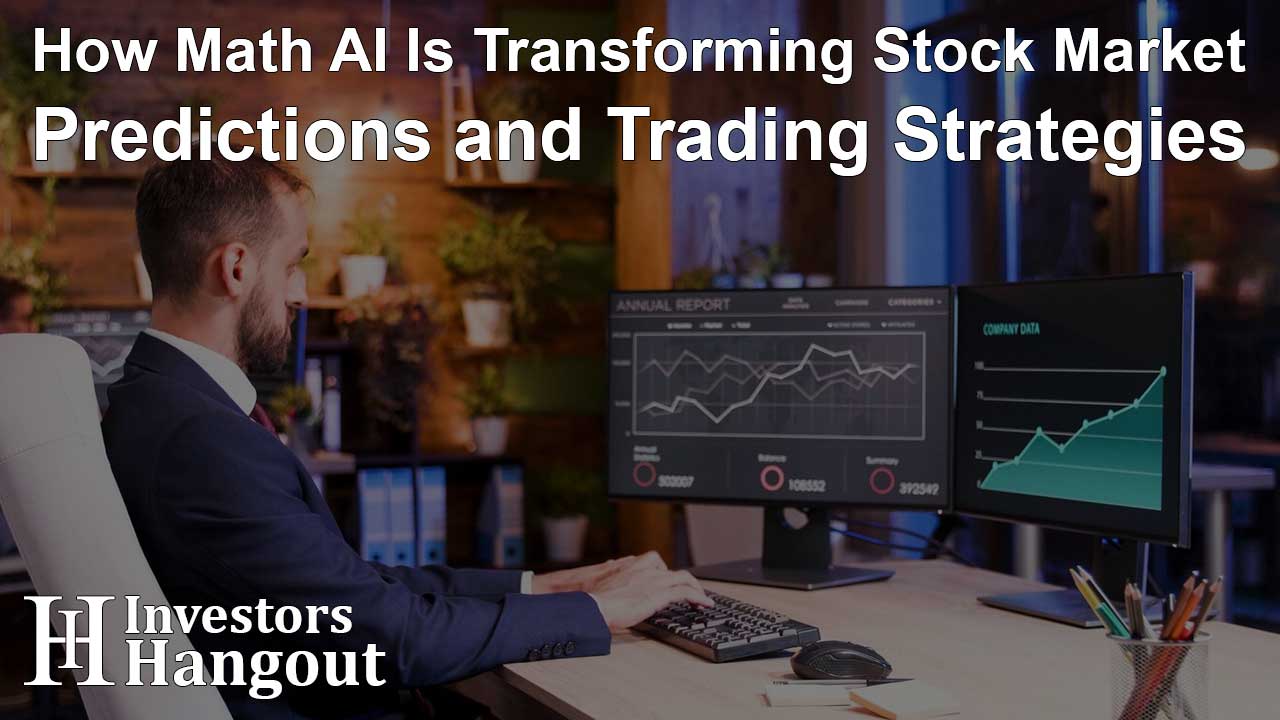How Math AI Is Transforming Stock Market Predictions and Trading Strategies

The stock market has always been a battlefield of numbers, instincts, and strategy. But now, something new is in play. Not just humans hunched over monitors, scanning candlestick charts, and interpreting trends—no, now algorithms, machine learning models, and artificial intelligence (AI) are changing the game. The days of relying solely on human intuition? Fading fast.
The Rise of Math AI in Trading
We have known about the existence of an accurate AI solver for some time now. Such a math somver app can perform even very complex calculations from a photo. At work or during study, an AI helper greatly simplifies working with numbers and allows you to optimize routine tasks. The next step in evolution is not just calculating, but predicting the future. This is the key to all stock markets, cryptocurrency, commodity markets, etc.
Mathematical AI isn’t about just crunching numbers faster; it’s about seeing patterns no human can spot. Take hedge funds, for instance—firms like Renaissance Technologies use AI-driven quant models to execute trades with surgical precision. These models analyze vast amounts of data in milliseconds, making decisions faster than a human blink.
And the numbers back it up. Algorithmic trading now accounts for nearly 60-73% of all US stock market trading volume. The machines aren’t just helping; they’re running the show. But how exactly?
AI’s Role in Market Predictions
Stock market predictions used to be the domain of analysts with years of experience. Now, AI can digest news articles, earnings reports, and even social media sentiment to forecast stock movements. A study by J.P. Morgan revealed that AI-based trading models are now outperforming traditional models by up to 10% in accuracy.
Imagine an AI scanning global headlines, identifying keywords like "inflation spike," "supply chain disruptions," or "tech layoffs"—then correlating that with past market behavior to predict stock movements. It’s not fortune-telling. It’s mathematics, statistics, and deep learning working together.
How AI Shapes Trading Strategies
The way stocks are traded? AI is redefining it. Let’s break it down:
-
High-Frequency Trading (HFT): AI-driven trading bots execute thousands of trades per second, capitalizing on tiny price fluctuations. No human trader can match that speed.
-
Sentiment Analysis: AI scans Twitter, Reddit, and financial news, determining whether public sentiment is bullish or bearish. A single Elon Musk tweet? AI algorithms react before traders even refresh their screens.
-
Risk Management: AI models detect patterns of volatility, reducing exposure to risky trades. They hedge portfolios in real time, minimizing losses during market crashes.
A prime example? The AI-powered fund EquBot, which uses IBM Watson to make trading decisions, has consistently outperformed traditional index funds in certain periods.
AI vs. Human Traders: Who Wins?
Human traders rely on experience, intuition, and emotions. AI relies on data, probability, and speed. Which wins? The results are clear:
-
AI-driven hedge funds reported an 8.44% annual return between 2010 and 2020, while human-managed funds averaged 4.27%.
-
AI systems don’t panic. Humans do. Market crashes—like in 2008—were driven by human fear. AI, on the other hand, follows logic, not emotion.
Yet, humans aren’t completely obsolete. AI still lacks creativity. It can’t predict black swan events—those rare, unpredictable market disruptions. That’s where human judgment comes in.
The Ethical and Market Impacts of AI Trading
With AI dominating trading, concerns arise. Can the market become too dependent on machines? What happens if AI models all react the same way—triggering mass selloffs?
Regulatory bodies like the SEC are watching closely. Flash crashes, like the 2010 event where the market lost $1 trillion in minutes, highlight the risks of AI-driven trading.
Moreover, there’s the fairness question. If hedge funds with cutting-edge AI control the market, do retail investors even stand a chance? The rise of AI-powered tools like Robinhood’s algorithmic trading features is an attempt to level the playing field, but the gap remains.
Conclusion: The Future of AI in Trading
AI isn’t just an assistant in stock trading anymore; it’s the strategist, the risk manager, and sometimes even the trader itself. From HFT to sentiment analysis, its role is growing, and market predictions are getting sharper.
But one thing remains true: the stock market thrives on unpredictability. No algorithm, no matter how advanced, can eliminate uncertainty completely. That’s why, despite all the AI-driven advancements, human traders—armed with creativity, experience, and a gut feeling that machines can’t replicate—still have a seat at the table. For now.
About The Author
Contact Thomas Cooper privately here. Or send an email with ATTN: Thomas Cooper as the subject to contact@investorshangout.com.
About Investors Hangout
Investors Hangout is a leading online stock forum for financial discussion and learning, offering a wide range of free tools and resources. It draws in traders of all levels, who exchange market knowledge, investigate trading tactics, and keep an eye on industry developments in real time. Featuring financial articles, stock message boards, quotes, charts, company profiles, and live news updates. Through cooperative learning and a wealth of informational resources, it helps users from novices creating their first portfolios to experts honing their techniques. Join Investors Hangout today: https://investorshangout.com/
